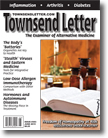Page 1, 2
Our Recommendations to the FDA to Evaluate Homeopathy
When the FDA takes a look at modern homeopathy, its safety and efficacy, we hope that the agency will take into account that homeopathic medicines have been considered safe since legislation authorizing the use of homeopathic medicines that were listed in the Homeopathic Pharmacopeia of the United States in1906 and again in 1938. The FDA has not been regulating homeopathic medicines as to safety or effectiveness.
According to the NIH National Center for Complementary and Integrative Health, a 2007 systematic review found that highly diluted homeopathic remedies, taken under the supervision of trained professionals, are generally safe and unlikely to cause severe adverse reactions. However, their guidelines also say, "There is little evidence to support homeopathy as an effective treatment for any specific condition." We disagree with that assumption, given the paucity of research on homeopathy and the bias that exists among conventional medical journals against research on homeopathic medicine, as well as a severe lack of funding for homeopathic research in educational institutions that could potentially generate good quality research on homeopathic medicine.
The research methods used so far in research on homeopathic medicine are ill suited to the task. Homeopathic treatment is individualized to the person with the illness, not the disease itself. There needs to be a research design that focuses on how well the homeopathic treatment has addressed the total health of the person, physically, mentally, and emotionally before and after treatment, by comparing reported and observable symptoms that have changed. These symptoms can vary in type, specific quality, frequency, intensity, duration, mental and emotional effects on the patient, and a variety of other factors. These differences in reported symptoms are what a homeopath uses to find the best medicine for the patient. In order to assess the clinical effects of homeopathic medicine, it is necessary to create a research model that is compatible with the individualization of treatment that is at the core of homeopathy. Trials of over-the-counter homeopathic preparations with single or multiple homeopathic remedies for a specific acute health condition with easily defined symptoms and parameters for improvement could possibly be tested in more conventional ways, as there is less individualization of treatment in that context.
We hope that the FDA will give due consideration and sincerely reflect on all sides of the issues surrounding the use and regulation of homeopathic medicine. We want to make sure that homeopathy, whether practiced by practitioners or purchased over the counter, will remain readily available to those who wish to use this medical system. If additional research is needed, we hope that it can be done in an environment of unbiased investigation, taking into account the significant differences in concepts and practice between homeopathic and conventional medical theory and practice.
What You Can Do to Help Preserve Homeopathic Freedom in the US
The comment period by stakeholders and interested parties lasts until the end of June, so there is still time to make your voice heard. For information on the hearings, obtaining transcripts, and how to make written comments before the deadline, go to: http://www.fda.gov/Drugs/NewsEvents/ucm430539.htm.
To see the original Federal Register announcement of the hearings, go to the URL above and click on the "Federal Register" link.
Notes
1. Homeopathy: an introduction [Web page]. National Center for Complementary and Integrative Health. https://nccih.nih.gov/health/homeopathy.
2. Bornhöft G, Matthiessen PF, eds. Homeopathy in Healthcare – Effectiveness, Appropriateness, Safety, Costs. Springer Berlin Heidelberg; 2011.
Page 1, 2 |
![]()
![]()
![]()




